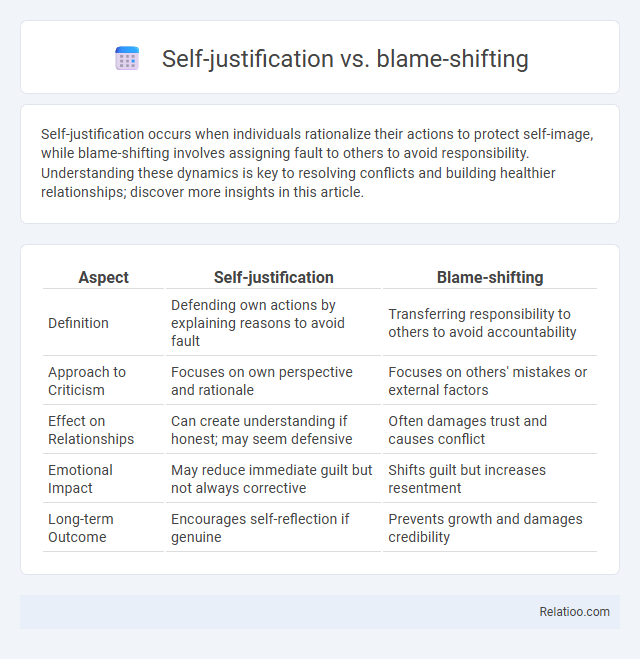Self-justification occurs when individuals rationalize their actions to protect self-image, while blame-shifting involves assigning fault to others to avoid responsibility. Understanding these dynamics is key to resolving conflicts and building healthier relationships; discover more insights in this article.
Table of Comparison
| Aspect | Self-justification | Blame-shifting |
|---|---|---|
| Definition | Defending own actions by explaining reasons to avoid fault | Transferring responsibility to others to avoid accountability |
| Approach to Criticism | Focuses on own perspective and rationale | Focuses on others' mistakes or external factors |
| Effect on Relationships | Can create understanding if honest; may seem defensive | Often damages trust and causes conflict |
| Emotional Impact | May reduce immediate guilt but not always corrective | Shifts guilt but increases resentment |
| Long-term Outcome | Encourages self-reflection if genuine | Prevents growth and damages credibility |
Understanding Self-Justification: Definition and Origins
Self-justification is a cognitive process where individuals rationalize their actions or decisions to maintain self-esteem and reduce psychological conflict. This phenomenon originates from the need to preserve a positive self-image, often leading to biased reasoning that aligns with one's beliefs and values. Unlike blame-shifting, which involves attributing fault to others, self-justification centers on internally validating one's choices to avoid guilt or accountability.
What Is Blame-Shifting? Key Characteristics
Blame-shifting is a defense mechanism where individuals transfer responsibility for their mistakes or wrongdoings onto others to avoid accountability. Key characteristics include denying personal fault, projecting problems onto external sources, and manipulating the narrative to protect self-image. This behavior often leads to strained relationships and hinders personal growth by preventing honest self-reflection.
Psychological Roots: Why We Deflect Responsibility
Self-justification and blame-shifting both stem from psychological defense mechanisms aimed at preserving self-esteem and avoiding guilt. Your mind often distorts reality to protect against feelings of failure by rationalizing mistakes (self-justification) or redirecting fault onto others (blame-shifting). These behaviors reveal deep-rooted fears of inadequacy and the need to maintain a positive self-image despite external accountability.
Self-Justification vs. Blame-Shifting: Core Differences
Self-justification involves rationalizing your own actions to maintain a positive self-image, while blame-shifting assigns responsibility for mistakes or failures onto others to avoid accountability. Core differences lie in the intent: self-justification protects your ego by explaining why your behavior was acceptable, whereas blame-shifting externalizes fault to deflect criticism. Understanding these distinctions helps improve personal accountability and interpersonal relationships.
Common Scenarios: Everyday Examples of Both Behaviors
In everyday situations, self-justification often appears when you explain your actions to maintain a positive self-image, such as defending a missed deadline by citing unexpected workload. Blame-shifting occurs when you redirect responsibility onto others, like accusing a colleague for project delays despite shared accountability. Recognizing these behaviors helps in understanding communication dynamics and improving personal accountability.
Impact on Relationships: Trust, Communication, and Conflict
Self-justification often leads to reduced trust and impaired communication as individuals prioritize defending their actions over understanding others, fostering resentment and unresolved conflict. Blame-shifting damages relationships by eroding accountability, escalating misunderstandings, and creating an environment of distrust and hostility. Effective conflict resolution relies on transparent communication and mutual responsibility, which are undermined by both self-justification and blame-shifting, ultimately weakening relationship bonds.
Consequences for Personal Growth and Accountability
Self-justification can hinder your personal growth by preventing honest self-reflection and delaying accountability, while blame-shifting erodes trust and damages relationships by deflecting responsibility onto others. Embracing genuine accountability fosters learning from mistakes and promotes emotional maturity, which ultimately supports meaningful development. Understanding these dynamics helps you recognize and overcome barriers to self-improvement and builds stronger, more responsible character traits.
Recognizing Self-Justification and Blame-Shifting in Yourself
Recognizing self-justification involves identifying when you create rationalizations to defend your actions or decisions despite evidence to the contrary, often to protect your self-esteem. Blame-shifting occurs when you deflect responsibility for mistakes or failures onto others, avoiding accountability and hindering personal growth. Awareness of these behaviors enables improved emotional intelligence and healthier interpersonal relationships by fostering honesty and responsibility.
Strategies for Overcoming Deflective Behaviors
Addressing self-justification, blame-shifting, and denial requires strategies that foster accountability and self-awareness. You can challenge these deflective behaviors by actively practicing reflective listening, setting clear personal boundaries, and promoting honest self-assessment. Implementing tools like journaling or feedback loops enhances emotional intelligence, helping to reduce defensive reactions and improve interpersonal trust.
Building Healthy Accountability: Steps Toward Honest Self-Reflection
Building healthy accountability involves recognizing the differences between self-justification and blame-shifting, where self-justification seeks to protect one's self-image by rationalizing mistakes, while blame-shifting redirects responsibility onto others. Honest self-reflection requires acknowledging personal faults without distortion or deflection, fostering growth and trust within relationships. Developing this skill enhances emotional intelligence, promotes ethical behavior, and supports constructive problem-solving in both personal and professional contexts.

Infographic: Self-justification vs Blame-shifting
 relatioo.com
relatioo.com